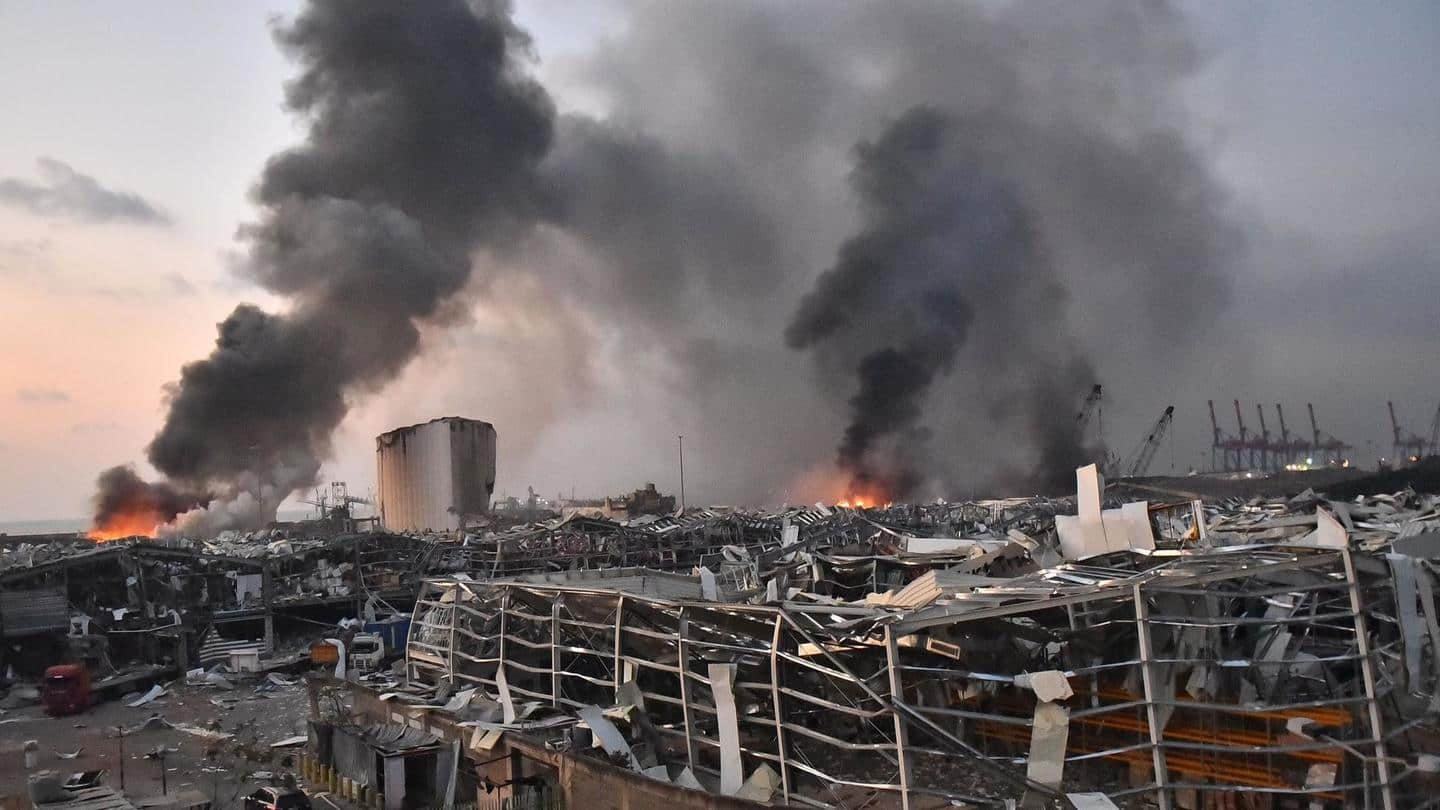
Explosion jolts Lebanese capital Beirut, over 70 killed, thousands injured
What's the story
Lebanon slipped into mourning after a massive explosion ripped capital Beirut apart, killing at least 78 and injuring nearly 4,000 people on Tuesday.
The huge explosion near the port in the seaside capital triggered a mammoth mushroom cloud-shaped shock wave, destroyed distant buildings, and overturned cars.
Such was the intensity of the explosion that a 3.3 magnitude earthquake was felt.
Here are more details.
What happened
Massive explosion was preceded by a small blast
Before the massive blast, an explosion at the port, apparently sparked by fireworks, sent a plume of smoke.
Seconds later, another major blast was reported from a nearby building, that dispatched a huge orange fireball into the sky. Shocked eye-witnesses called the unprecedented blast "deafening."
In fact, the aftershock was felt in Cyprus as well, miles away from Beirut.
Twitter Post
Watch: A city's fortunes changed in seconds
Oh lord! This is a most heartbreaking image. This video seems to have been captured from a high rise building.
— Obianuju Ekeocha (@obianuju) August 4, 2020
It shows how a city can be reduced to rubbles within seconds.
Our fragile lives are in God’s hands.
Please pray for #Beirut . pic.twitter.com/ugfZCA48sk
Reason
According to PM, 2,000+ tons of ammonium nitrate sparked explosion
As the world looked towards Lebanon with shock and trauma, Prime Minister Hassan Diab tried making sense of the explosion. He said 2,750 tons of ammonium nitrate, which is used in fertilizers and is highly explosive, had been stored at a warehouse for six years without any precautions.
"It is unacceptable and we cannot remain silent on this issue," Diab said.
Assurance
Those responsible will pay a price, assured PM
Diab also said that as the head of the country, he won't relax until those responsible are punished.
"Those responsible will pay a price for this catastrophe," he said, adding that Wednesday will be a national day for mourning.
Naturally, many thought Beirut was attacked but Maj. Gen. Abbas Ibrahim, the head of Lebanon's general security service, suggested against getting "ahead of the investigation."
Damage
Health Minister said it was difficult to assess damage
In his initial comments, Health Minister Hamad Hasan said assessing damage has become difficult.
"People are asking the emergency department about their loved ones and it's difficult to search at night because there is no electricity," he said.
Meanwhile, Beirut's Governor Marwan Abboud said the scene reminded him of Hiroshima and Nagasaki, the Japanese towns where atom bombs were dropped during World War II.
Sentiment
We are cursed: Traumatized residents stare at gloom and uncertainty
The blast came at a time when Lebanon is in the middle of an economic crisis. Unemployment is rising, the currency is tanking, and poverty has trumped 50% in the country.
Due to years of war, the capital is not new to bombings, but the latest incident was unlike anything the bewildered citizens had seen.
A local told Guardian that "they were cursed."
Quote
Locals look at the long road ahead
"How do we recover? There are thousands of windows missing across the city, and that's the least of our worries. No money, jobs, power, fuel. And now this. Will it be a wake-up call, or will there be a war?" another local asked.
Hospitals
Hospitals, burdened with COVID-19 cases, struggled to cater to injured
Notably, the hospitals in the capital, that were already dealing with a worrying spurt in coronavirus cases, were inundated with hundreds of injured patients. Some had a broken limb, some struggled to get glass pieces out of their bodies, and many remained unconscious.
Lebanese Red Cross took to Twitter to ask for blood donations, urging survivors to help the needy.
Details
Meanwhile, Trump seems convinced there is more to the explosion
Expressing concern for Lebanon, US President Donald Trump said, "This was not some kind of a manufacturing explosion type of event."
He said he spoke to US generals and they are convinced "it was a bomb of some kind."
Indian Prime Minister Narendra Modi was shocked and saddened as well. "Our thoughts and prayers are with the bereaved families (sic)," he said.